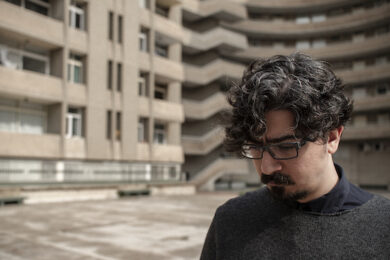7. Schoenberg

My father’s record collection was very Beethoven oriented, Shostakovitch, and a few romantic ones, but none of the degenerate ones like Shoenberg. But he encouraged me – he said whenever you want money for a book about music, or a CD, you can have it. I bought a book, a famous book called Appreciation Of Music when it was published for the first time in Iran. It’s a course book of music history that goes through all the eras. I fell in love with Schoenberg’s life and his personality.
What details do you remember standing out about his life?
He didn’t go to the academy at first, he knew all the stuff people in the academy knew about, but he went: ‘Fuck it, I’m gonna do something else. I know all of it, I respect all of it, but I’m gonna bend it to my needs of expression’. For a goth loner like me that was good. So my love of romanticism, both in literature and in music, started with Schoenberg. At the time, I couldn’t find anything by him, but I had a harmony teacher who was very generous with his collection, he gave me this one. This one ignited something in me that still remains, about how closely arts were connected. This poetry is essential, literature is essential, films are my life, music is my life and all these are connected – and all these should go together and inspire each other. Nothing is separate. The imagination is what they all have in common. For me sitting in my room in the south of Iran, and then like in my room in Tehran, this kind of reading and listening and watching, and going to find these those connections was like going on an adventure, and then at some point your life becomes these adventures that you, yourself have a creator. All those these all these things started with Schoenberg and the late romantics for me.
That sounds like a huge revelation, but you mentioned you were at school then – did those huge cultural ideas contrast with your daily life at school?
That’s when skipping school started [laughs]. If you read Schoenberg’s life to a relative of mine, he says oh, what a loser, what a sad fucking life, why didn’t he kill himself? And it is that part – it’s inside that matters, because outside was very different. Both emotional and being in being involved in any work of intellectual substance was frowned upon. Because people have seen so much of this work going wrong, people being dead or in jail. So it’s a no – no, you shouldn’t do that, no, you shouldn’t go there. Because they know it’s gonna end badly.
That’s very high stakes. Was there ever any sense in which you sent felt risk following this path, into music, because if your parents were very encouraging, but it sounds like in terms of society, it was potentially dangerous?
Yeah, it was, my parents were encouraging to an extent. They thought I would come to my senses, but I just kept going.


